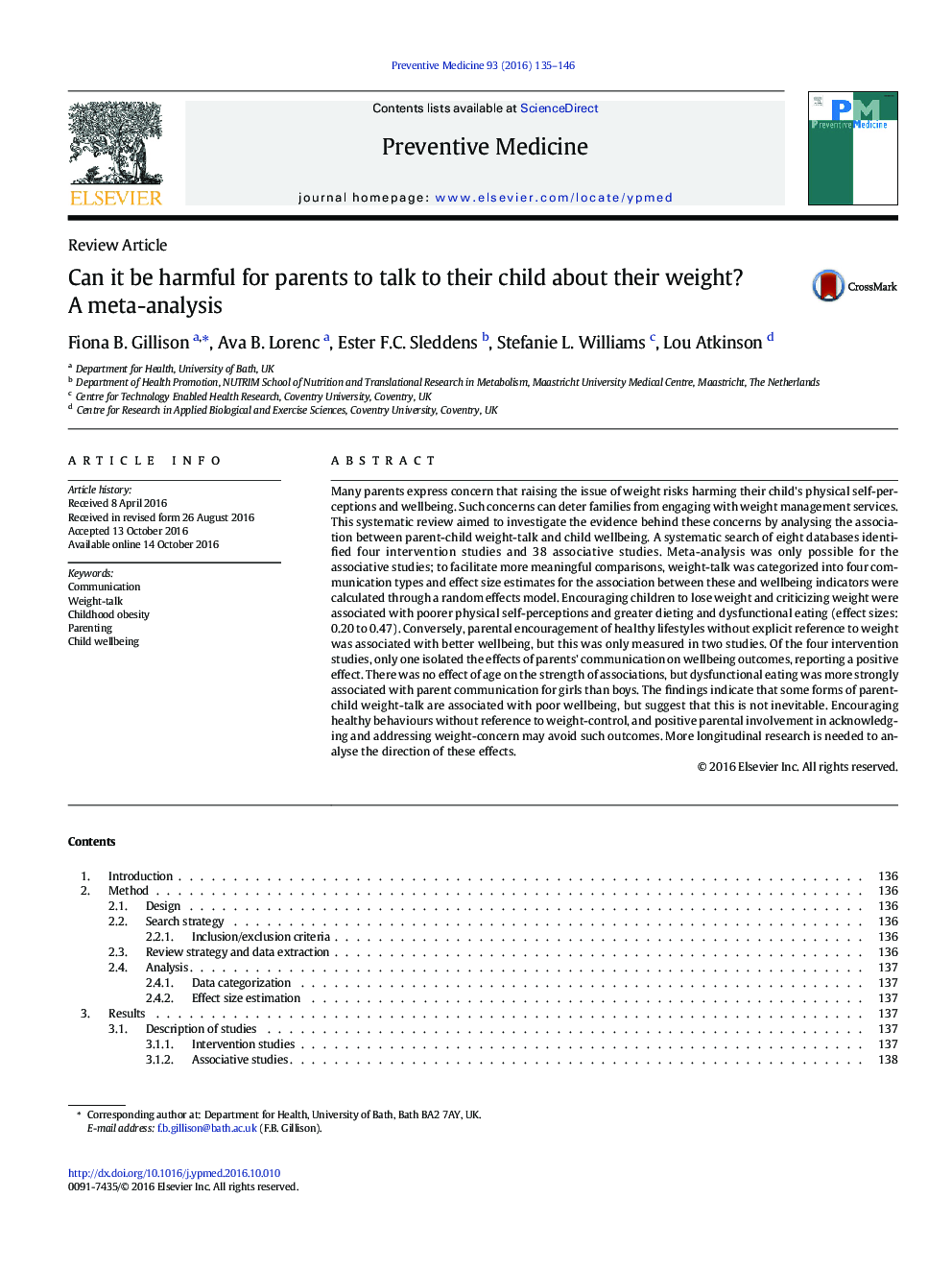| کد مقاله | کد نشریه | سال انتشار | مقاله انگلیسی | نسخه تمام متن |
|---|---|---|---|---|
| 8693818 | 1581621 | 2016 | 12 صفحه PDF | دانلود رایگان |
عنوان انگلیسی مقاله ISI
Can it be harmful for parents to talk to their child about their weight? A meta-analysis
ترجمه فارسی عنوان
آیا می توان برای والدین مضر برای صحبت با کودک خود در مورد وزن خود را؟ یک متا آنالیز
دانلود مقاله + سفارش ترجمه
دانلود مقاله ISI انگلیسی
رایگان برای ایرانیان
کلمات کلیدی
ارتباطات، بحث وزن، چاقی دوران کودکی، والدین، سلامتی کودک،
ترجمه چکیده
بسیاری از والدین ابراز نگرانی می کنند که افزایش ریسک وزن باعث آسیب رساندن به خواسته های فیزیکی و سلامتی فرزندانشان می شود. چنین نگرانی ها می توانند خانواده ها را از مشارکت با خدمات مدیریت وزن جلوگیری کنند. این بررسی سیستماتیک با هدف بررسی شواهدی مبنی بر این نگرانی ها با تحلیل رابطه بین گفتار وزن والدین و کودک و سلامت کودک انجام شده است. یک جستجوی سیستماتیک از هشت پایگاه داده، چهار مطالعه مداخله و 38 مطالعات مرتبط را شناسایی کرد. متاآنالیز تنها برای مطالعات وابسته امکان پذیر است؛ برای تسهیل مقایسه های معنی دار بیشتر، بحث وزن به چهار نوع ارتباط و تخمین اندازه اثر برای ارتباط بین این شاخص ها و شاخص های سلامت با استفاده از یک مدل اثرات تصادفی محاسبه شد. تشویق کودکان به از دست دادن وزن و انتقاد از وزن همراه با درک خواسته های بد فیزیکی و رژیم غذایی و خوردن ناکافی بود (اندازه اثر: 0.20 تا 0.47). برعکس، تشویق والدین از شیوه زندگی سالم بدون اشاره صریح به وزن با سلامت بهتر همراه بود، اما این تنها در دو مطالعه اندازه گیری شد. از چهار مطالعه مداخله، تنها یکی از اثرات ارتباط والدین با پیامدهای بهزیستی، تأثیر مثبتی بر روی آن گذاشته شد. هیچ تاثیر سن بر قدرت انجمن ها وجود نداشت، اما خوردن غذا ناکارآمد با ارتباط والدین دختران نسبت به پسران بیشتر مرتبط بود. یافته های این تحقیق نشان می دهد که برخی از اشکال گفتاری با والدین و کودک با سلامتی فقیر همراه است، اما نشان می دهد که این اجتناب ناپذیر است. تشویق رفتارهای سالم بدون اشاره به کنترل وزن و دخالت والدین مثبت در تصدیق و رعایت نگرانی های وزن ممکن است از چنین نتیجه هایی اجتناب شود. تحقیقات طولی بیشتر برای تجزیه و تحلیل جهت این اثرات ضروری است.
موضوعات مرتبط
علوم پزشکی و سلامت
پزشکی و دندانپزشکی
طب مکمل و جایگزین
چکیده انگلیسی
Many parents express concern that raising the issue of weight risks harming their child's physical self-perceptions and wellbeing. Such concerns can deter families from engaging with weight management services. This systematic review aimed to investigate the evidence behind these concerns by analysing the association between parent-child weight-talk and child wellbeing. A systematic search of eight databases identified four intervention studies and 38 associative studies. Meta-analysis was only possible for the associative studies; to facilitate more meaningful comparisons, weight-talk was categorized into four communication types and effect size estimates for the association between these and wellbeing indicators were calculated through a random effects model. Encouraging children to lose weight and criticizing weight were associated with poorer physical self-perceptions and greater dieting and dysfunctional eating (effect sizes: 0.20 to 0.47). Conversely, parental encouragement of healthy lifestyles without explicit reference to weight was associated with better wellbeing, but this was only measured in two studies. Of the four intervention studies, only one isolated the effects of parents' communication on wellbeing outcomes, reporting a positive effect. There was no effect of age on the strength of associations, but dysfunctional eating was more strongly associated with parent communication for girls than boys. The findings indicate that some forms of parent-child weight-talk are associated with poor wellbeing, but suggest that this is not inevitable. Encouraging healthy behaviours without reference to weight-control, and positive parental involvement in acknowledging and addressing weight-concern may avoid such outcomes. More longitudinal research is needed to analyse the direction of these effects.
ناشر
Database: Elsevier - ScienceDirect (ساینس دایرکت)
Journal: Preventive Medicine - Volume 93, December 2016, Pages 135-146
Journal: Preventive Medicine - Volume 93, December 2016, Pages 135-146
نویسندگان
Fiona B. Gillison, Ava B. Lorenc, Ester F.C. Sleddens, Stefanie L. Williams, Lou Atkinson,
